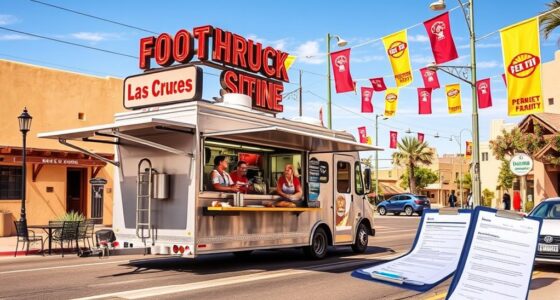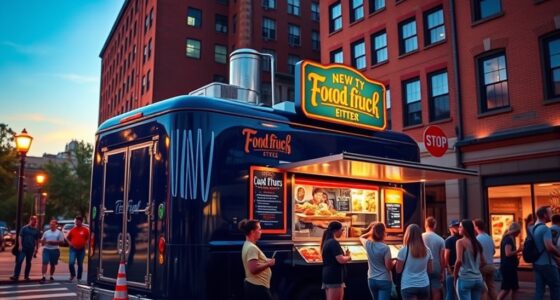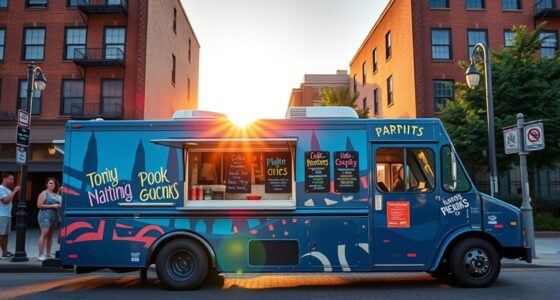To open a food truck in Rehoboth Beach, Delaware, you need permits like a Food Establishment Permit costing around $100 and possibly a Mobile Food Service License. Startup costs vary from $50,000 to over $200,000, depending on your truck and equipment. Focus on prime locations along Highway One and at local events. For a standout menu, consider trend-driven options, and boost visibility with social media and community engagement. If you explore further, you’ll gain valuable insights to make your food truck a success.
Key Takeaways
- Obtain necessary permits including a Food Establishment Permit ($100/year) and Delaware Business License, complying with local zoning laws.
- Startup costs range from $50,000 to over $200,000, covering truck purchase, modifications, equipment, and permits.
- Focus on prime locations along Highway One in C-1 zones, and secure property owner permissions for seasonal or event vending.
- Design diverse menus with trendy options like plant-based, ethnic dishes, artisanal desserts, and rustic decor to attract customers.
- Use social media, participate in local festivals, and implement loyalty programs to boost visibility and customer engagement.
Navigating Permits and Licensing Requirements
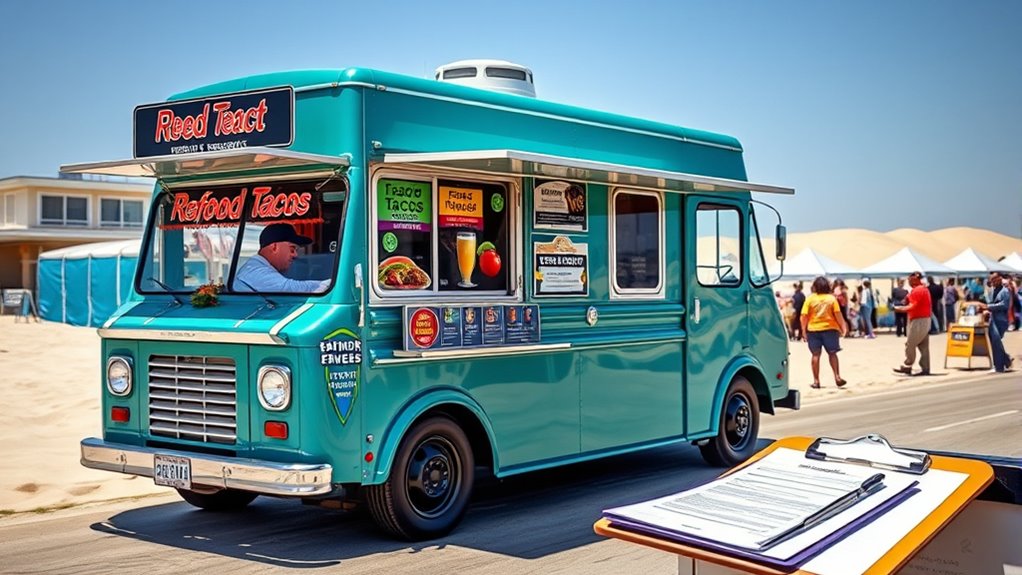
Starting a food truck business in Rehoboth Beach requires maneuvering a series of permits and licensing requirements to operate legally. First, you need a Food Establishment Permit, costing $100 annually, plus plan review fees of $50-$100 based on your unit’s size. You’ll also need a Delaware General Business License for all business activities in the state. If operating in Wilmington or other localities, a Mobile Food Service Establishment License might be necessary. You must comply with local zoning laws; your truck should be in General Commercial C-1 zones and meet setback and parking rules. A final site plan approval from Sussex County is essential. Additionally, you’ll undergo a detailed plan review, inspections, and ongoing permit renewals to make certain of compliance with health and safety standards. Ensuring your operation aligns with vetted regulations helps prevent potential legal issues down the line.
Estimating Startup and Operating Expenses
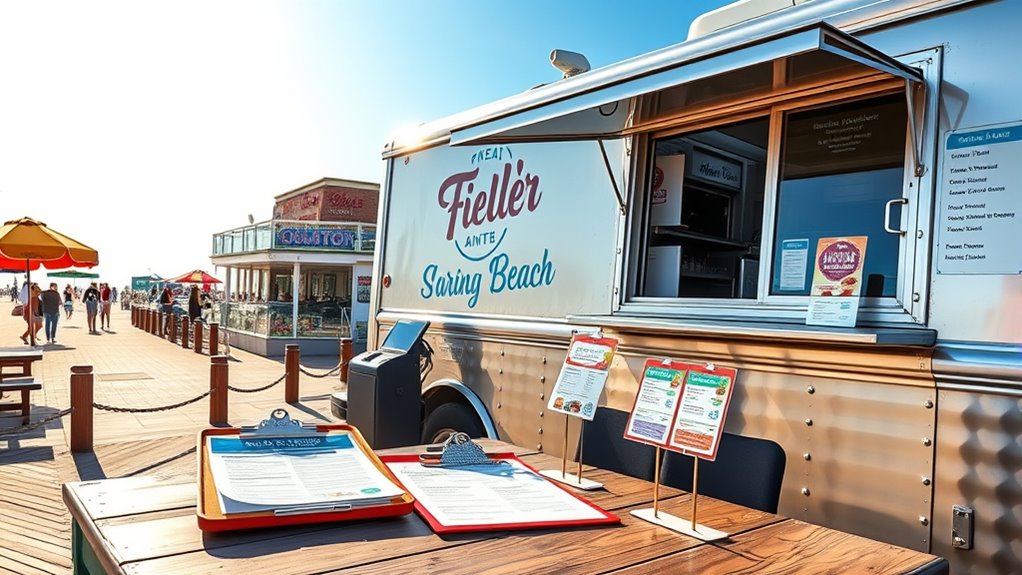
Estimating your startup and ongoing operating expenses is a vital step in planning your food truck business in Rehoboth Beach. Picture yourself budgeting for:
Budget wisely for your food truck startup and daily operations in Rehoboth Beach.
- A new truck costing between $75,000 and $200,000, or a used one around $50,000 to $100,000, with additional costs for custom modifications. Custom modifications can include specialized equipment or branding updates tailored to your menu and style. To keep expenses manageable, consider implementing budgeting tricks such as automating savings contributions and reviewing your budget monthly for optimal performance.
- Kitchen equipment and serveware adding several thousand dollars to guarantee your menu runs smoothly.
- Permits and licenses ranging from about $1,864 to over $28,000, depending on local requirements.
- Monthly expenses like fuel, supplies, wages, and utilities totaling $5,000 to $10,000, fluctuating with business growth and inflation. Accurate budgeting for these ongoing costs is essential to ensure profitability and sustainability. Regularly assessing and adjusting your financial priorities will help maintain your business’s financial health.
Identifying Prime Locations and Vending Zones
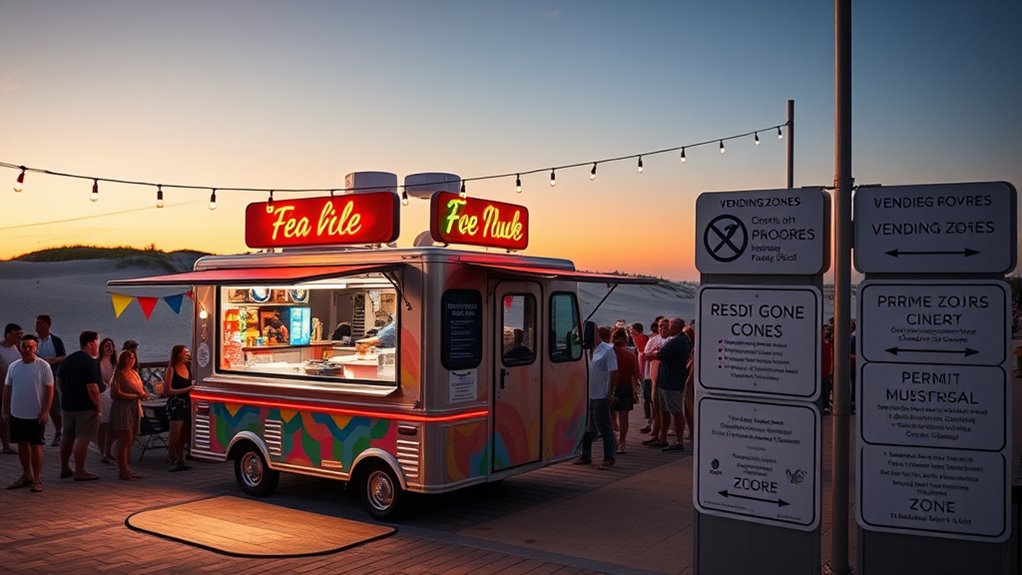
To succeed in Rehoboth Beach, choosing the right location for your food truck is essential, as it directly influences foot traffic and sales. Focus on sites within the C-1 General Commercial Zoning District along Highway One near Rehoboth Beach, where retail and restaurant uses are permitted. Most vendors operate seasonally in existing shopping center parking lots, especially near busy thoroughfares. Securing permission from property owners and complying with zoning rules is vital, especially if you plan to set up in setback areas or residential zones, which require permits or variances. Temporary vending in B-1, C-1, and CR-1 districts is possible with over-the-counter approvals. For large events and festivals, understanding specific zones and adhering to health and safety regulations can boost your visibility and sales. Additionally, selecting a name that resonates with your brand, such as a preppy dog name, can help attract attention and establish your identity in the community.
Designing a Trend-Driven and Diverse Menu
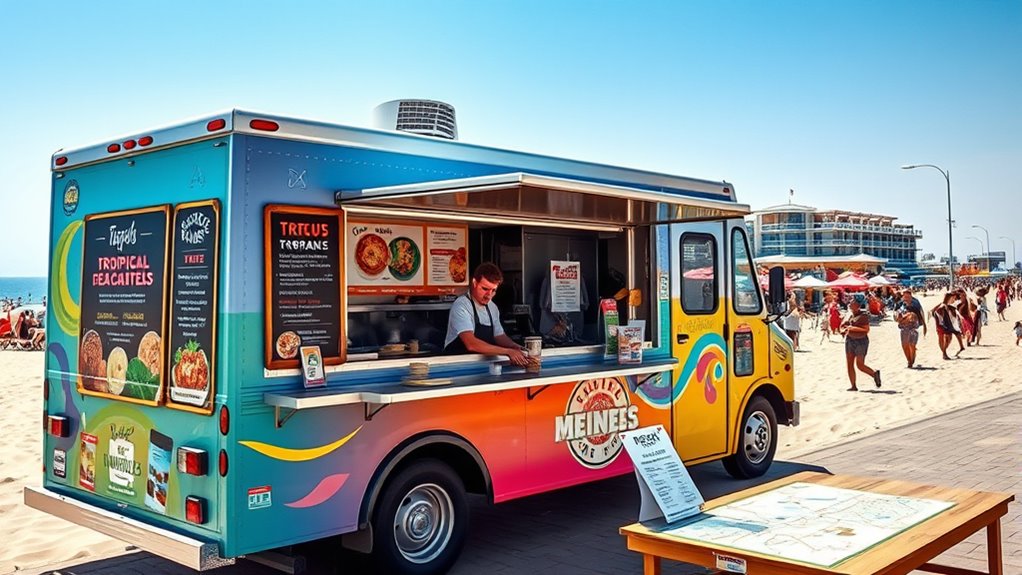
Designing a trend-driven and diverse menu requires understanding current customer preferences and offering options that resonate with a wide range of tastes. To do this, picture your menu featuring:
Creating a diverse menu that reflects current tastes boosts customer satisfaction and sales.
- Juicy hamburger variations, including plant-based and veggie options, perfectly customizable for each customer. Incorporating rustic decor elements into your food truck can enhance the overall dining experience and attract customers seeking a cozy, farmhouse-inspired vibe.
- Authentic ethnic dishes like Ethiopian injera or Korean street tacos that tell a cultural story.
- Sweet treats such as artisanal ice cream or Japanese cheesecakes, appealing to dessert lovers.
- Health-conscious choices like keto-friendly bowls, gluten-free snacks, and fresh vegetable-forward meals. Hamburgers are a popular street food option that can be easily differentiated through unique toppings and styles, making them a versatile choice for your diverse menu.
Effective Marketing and Customer Engagement Strategies
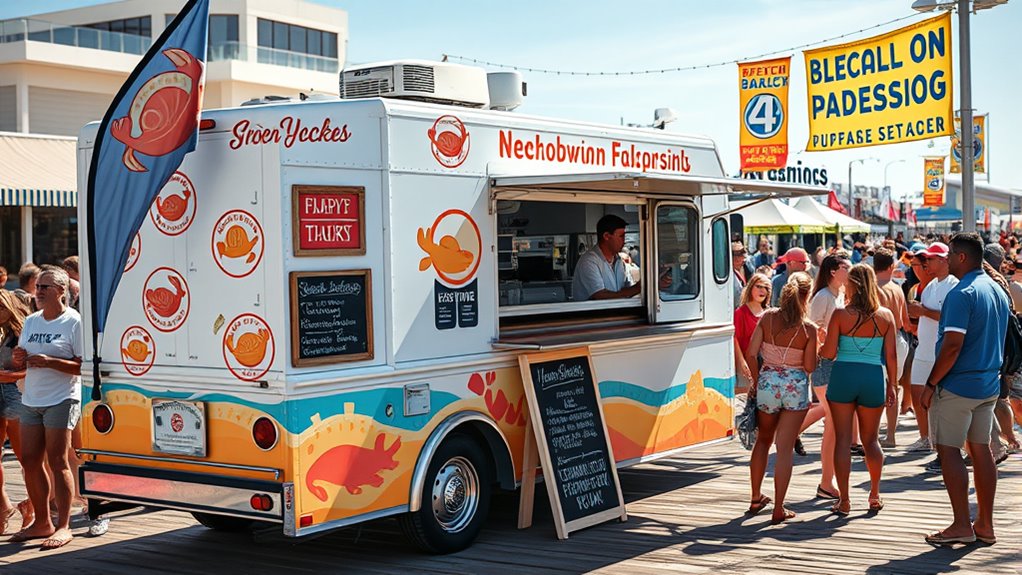
Effective marketing and customer engagement are essential for standing out in the competitive food truck scene. You should leverage social media platforms like Facebook, which 75% of trucks use to connect with customers and announce specials. Regular online engagement can boost sales by around 20% and increase customer spending by 15%. Participating in local events and food festivals is another powerful strategy, with 80% of trucks attending at least three annually to expand visibility and build community loyalty. Implementing loyalty programs, whether punch cards or app-based, can raise repeat visits by 30%. Use data analytics to optimize marketing efforts, focusing on high-traffic locations and peak times. Keep your marketing budget between 3% and 6% of revenue to target your audience effectively and maximize your return on investment. Data-driven strategies can further enhance your marketing effectiveness by providing insights into customer preferences and behavior, especially when integrated with AI content clusters to identify trending topics and personalize outreach.
Frequently Asked Questions
How Long Does the Permit Approval Process Typically Take in Rehoboth Beach?
You’re wondering how long it takes to get your permit approved in Rehoboth Beach. The process can take several weeks to a few months because multiple agencies review your application, zoning, and safety plans. Starting early helps avoid delays, especially if modifications are needed. Keep in mind, approval depends on the completeness of your application, compliance with regulations, and scheduling public hearings if required. Patience and thorough preparation speed things up.
Are There Specific Noise Restrictions for Food Trucks Operating on the Boardwalk?
You need to be aware that Rehoboth Beach enforces strict noise restrictions for food trucks on the boardwalk. You can’t use external speakers or amplifiers that produce excessive noise, and noise levels must stay below 85 dBA. Operating hours are limited, and loud music or entertainment isn’t allowed. To avoid fines, you must monitor noise levels carefully and use non-amplified methods to engage with customers.
What Are the Best Seasonal Times to Maximize Sales in Rehoboth Beach?
To maximize sales in Rehoboth Beach, you should focus on peak summer months, especially July and August, when visitor numbers and spending are highest. The long, warm season from June to mid-September attracts the most beachgoers, festivals, and outdoor activities. During weekends, holidays, and major events, demand spikes, making these times ideal for your food truck. Weather also plays a role, so plan for the warmest, driest days for the best results.
How Can I Differentiate My Food Truck From Existing Competitors Effectively?
Think of your food truck as a lighthouse shining uniquely in a crowded harbor. To stand out, you should develop a menu with exclusive, locally inspired dishes that aren’t available elsewhere. Use vibrant branding and active social media to draw attention. Partner with community events, choose high-traffic spots, and offer exceptional, friendly service. These strategies create a beacon that attracts loyal customers, making your truck the go-to spot in Rehoboth Beach.
What Are Common Challenges Faced by New Food Truck Owners in the Area?
You’ll face several challenges as a new food truck owner, including maneuvering complex permits, licenses, and health inspections. Securing prime locations can be tough due to zoning laws and competition. Costs for permits, vehicle setup, and ongoing fees add up quickly, while seasonal fluctuations make customer retention difficult. Additionally, limited operating hours and restrictions can impact revenue, and promoting your truck effectively requires strategic marketing amidst regulatory hurdles.
Conclusion
Opening a food truck in Rehoboth Beach is like planting a seed—your passion and planning nurture its growth. With the right permits, a tempting menu, and strategic spots, your venture can flourish amidst the bustling sands of success. Remember, each satisfied customer is a drop of water, fueling your journey. Stay creative and persistent, and watch your food truck bloom into a beloved beacon along Delaware’s coast. Your dream is ready to take flight.


